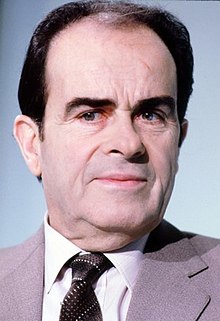Georges Marchais
Georges Marchais | |
|---|---|
 Georges Marchais in 1981 | |
| General Secretary of the French Communist Party | |
| In office 1972–1994 | |
| Preceded by | Waldeck Rochet |
| Succeeded by | Robert Hue |
| Personal details | |
| Born | 7 June 1920 La Hoguette, Calvados, France |
| Died | 16 November 1997 (aged 77) Paris, France |
| Political party | PCF |
| Signature | |
Georges René Louis Marchais (French pronunciation: [ʒɔʁʒə ʁəne lwi maʁʃɛ]; 7 June 1920 – 16 November 1997) was the head of the French Communist Party (PCF) from 1972 to 1994, and a candidate in the 1981 French presidential election.
Early life
Born in
Political career
He joined the
When Rochet fell ill, in 1970, he was promoted junior
In December 1972, he became officially General Secretary, following Waldeck Rochet's retirement. At first, he pursued the policy of his predecessor in favour of the "Union of the Left". In this, the PCF sided with François Mitterrand (PS)'s candidacy in the 1974 presidential election. At the beginning of his mandate of General Secretary, the PCF scored around 20% in the elections. But in mid-1970s, it lost its place of "first left-wing party" to François Mitterrand's Socialist Party. At the beginning, he supported reforms in the party, which participated to Eurocommunism with the Italian Communist Party of Enrico Berlinguer and the Spanish Communist Party of Santiago Carrillo and renounced the notion of a dictatorship of the proletariat (22nd congress, 1976). At first, he faced with the reproaches of Soviet leaders. Then, faced with electoral growing of the PS at the expense of his party, he imposed a re-alignment on the Soviet Union at the end of the 1970s.[6] The left-wing parties failed to update their Common Programme and lost the 1978 legislative election, even though they were leading in the polls. Outside and inside the party, he was accused of being responsible for this defeat. One year later, he supported the Soviet invasion of Afghanistan (1979),[7] judged the Communist governments "fairly positive", and criticized the "right-wing drift" of the Socialist Party. In the 1981 presidential election, he came fourth in the first round, with 15% of votes, thereafter endorsing Mitterrand, who won the second round.[8] He negotiated the entry of four PCF politicians in the cabinet of Prime Minister Pierre Mauroy.
In 1984, after President Mitterrand renounced the left's Common Programme and the electoral sanction in the
In 1994, at the 28th Congress of the PCF, he ceded his place as General Secretary to Robert Hue, although he maintained his titular role as a member of the Politburo, which was now significantly renamed the National Office. The same year, he became President of the PCF Comité pour la défense des libertés et droits de l'homme en France et dans le monde ("Committee for the defense of human liberties and rights in France and throughout the world"). He criticized the renovation of the party under his successor. He died in 1997.
Attitudes
Georges Marchais was a notable personality because of his mannerisms (Ct'un scandaaaale — "This is a scandal!") and brusque demeanor, often lambasted by comic Thierry Le Luron. He is particularly remembered for an outburst to journalist Jean-Pierre Elkabbach, Taisez-vous Elkabbach ("Shut up, Elkabbach!"), which was not actually ever said by Marchais (it was said by Pierre Douglas while imitating Marchais to Thierry Le Luron, who was himself imitating Raymond Barre).
During his TV performances, which stayed in the memory of French audiences, his tone with journalists and opponents was aggressive and humorous. For instance, questioned by Elkabbach and Alain Duhamel about his economic propositions, he answered: "you are privileged, you hold many jobs and make good salaries (in TV, radio, papers...), probably you are concerned by my proposition for a wealth tax, I understand why you don't want the change!"
Works
- Les Communistes et les Paysans – "The Communists and Peasantry" (1972)
- Le défi démocratique – "The Challenge of Democracy" (1973)
- La politique du PCF – "PCF Policies" (1974)
- Communistes et/ou chrétiens – "Communists and/or Christians" (1977)
- Parlons franchement – "Let's Be Frank" (1977)
- Réponses – "Answers" (1977)
- L'espoir au présent – "Hope in the Present" (1980)
- Démocratie – "Democracy" (1990)
Notes
- ^ "Obituary: Georges Marchais". The Independent. 17 November 1997.
- ^ a b Wilsford 302. "To this day, it is unclear why he left Paris in 1942 to work in Germany, although he has often been criticized for doing so."
- ^ Bruno Fuligni, La France rouge, 2011.
- ^ Brown 178.
- ^ Lane 614.
- ^ Penniman 74.
- ^ Brown 1982 13.
- ^ Wilsford, (1995) pp 304-5.
Bibliography
- Brown, Bernard (1974). Protest in Paris: Anatomy of a Revolt. Morristown, NJ: General Learning Press.
- Brown, Bernard (1982). Socialism of a Different Kind: Reshaping the Left in France. New York: Greenwood Press.
- Lane, A Thomas (1995). Biographical Dictionary of European Labor Leaders. Two volumes. Westport: Greenwood Press.
- Penniman, Howard (1988). France at the Polls, 1981 and 1986. Durham: Duke University Press.
- Wilsford, David (1995). Political Leaders of Contemporary Western Europe. Westport: Greenwood Press. pp 301–6.
